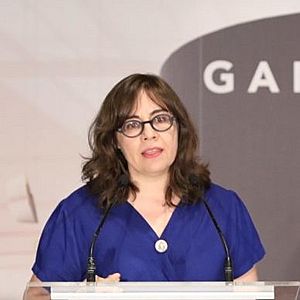Mercedes Cebrián facts for kids
Quick facts for kids
Mercedes Cebrián
|
|
|---|---|
 |
|
| Born |
Mercedes Cebrián Coello
29 May 1971 Madrid, Spain
|
| Alma mater | University of Pennsylvania |
| Occupation | Writer, translator |
Mercedes Cebrián was born on May 29, 1971. She is a talented writer and translator from Spain. She writes her own books and also helps translate books from other languages into Spanish.
Contents
About Mercedes Cebrián
Her Education and Early Career
Mercedes Cebrián studied at several universities. She earned a degree in Information Sciences from the Complutense University of Madrid. She also completed master's degrees in Hispanic Cultural Studies from Birkbeck, University of London and Hispanic Studies from the University of Pennsylvania.
She received special scholarships to live and work in places that help writers. From 2002 to 2004, she was a scholar at the Residencia de Estudiantes in Madrid. She also spent time at Ledig House in New York, the Spanish Academy in Rome, and other foundations in Italy and Spain. These experiences helped her develop her writing skills.
Writing for Newspapers and Magazines
Mercedes has written for many different newspapers and magazines. Her articles have appeared in Culturas (a part of La Vanguardia), Babelia, and El Viajero (parts of El País). She has also contributed to literary magazines like Turia, Eñe, and Letras Libres. For a time, she wrote a regular column for the newspaper Público.
How She Started Writing Poetry
Mercedes Cebrián began her writing journey by focusing on prose, which means writing stories and articles. However, in the early 2000s, she also started writing poetry. She explained that a scholarship at the Residencia de Estudiantes helped her discover the world of poetry. There, she met other young poets and learned about magazines that published poems. Her first poems appeared in an online magazine. Later, she shared her poetry at a reading and included poems in a book that also had stories.
Her book of short stories and poems, El malestar al alcance de todos, was published in 2004. Another book, La nueva taxidermia, came out later. It included two short novels. A reviewer from El Cultural said that Mercedes Cebrián is a very original writer. They noted that she shows new ways of looking at everyday things.
Mercedes Cebrián is sometimes linked to a group of writers called the Nocilla Generation. However, she doesn't fully agree with this idea. She does admit that her writing shares some similarities with theirs, like being interested in talking about the modern world.
In 2017, there was a disagreement about one of her translations. A translator and professor named Yolanda Morató said that Mercedes Cebrián's translation of a book by Georges Perec was too similar to her own. Mercedes Cebrián strongly denied this.
Books Mercedes Cebrián Has Translated
Mercedes Cebrián has translated many books from other languages into Spanish. Here are some of them:
- 2008 – The Architecture of Happiness, by Alain de Botton
- 2008 – L'Infra-ordinaire, by Georges Perec
- 2009 – A Man Asleep, by Georges Perec
- 2010 – La Boutique obscure: 124 rêves, by Georges Perec
- 2011 – Saturday Night and Sunday Morning, by Alan Sillitoe
- 2011 – It Chooses You, by Miranda July
- 2012 – The Loneliness of the Long-Distance Runner, by Alan Sillitoe
- 2013 – The Universe Versus Alex Woods, by Gavin Extence
- 2013 – Y revenir, by Dominique Ané
- 2013 – Sempre Susan, by Sigrid Nunez
- 2017 – Je me souviens, by Georges Perec
See also
 In Spanish: Mercedes Cebrián para niños
In Spanish: Mercedes Cebrián para niños
 | Ernest Everett Just |
 | Mary Jackson |
 | Emmett Chappelle |
 | Marie Maynard Daly |

